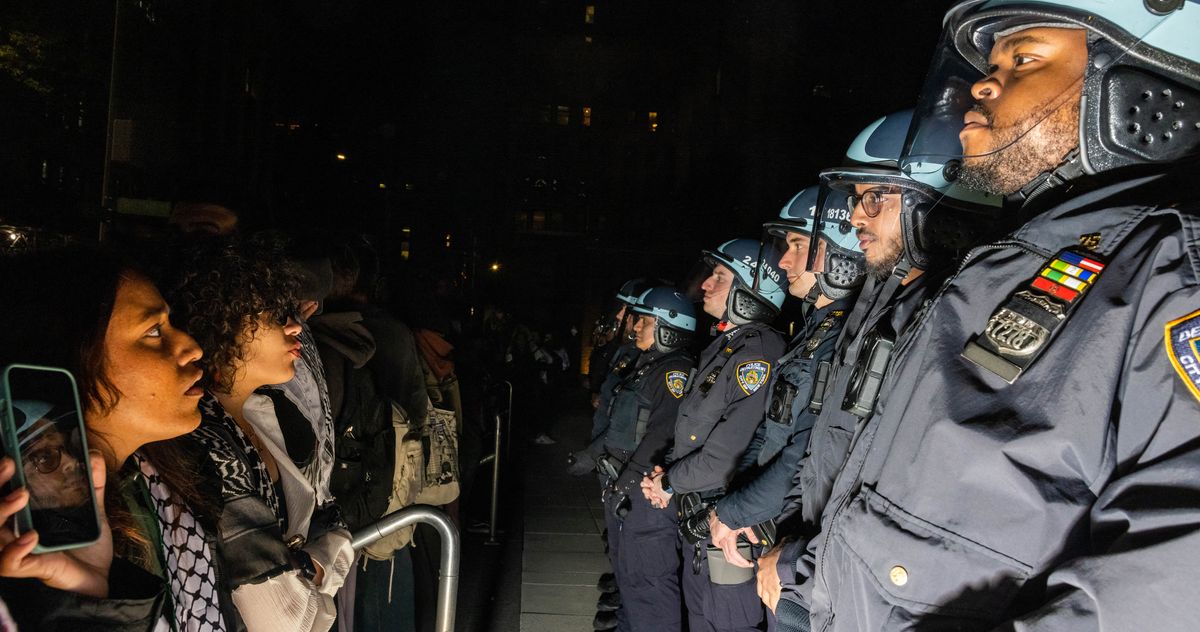Student Protesters Are Schooling Their Universities

24/04/2024 12:00
What is a university for? At Columbia University and its affiliated women's college, Barnard, it is ostensibly to value critical thought, a broad mind, and a commitment to reason. Only look at their websites, as any prospective student might do. Columbia's says the school wants "to educate future generations, create knowledge that will take humanity forward, and invest in community, both locally and globally," adding that it will "teach students how to think, not what to think." Or so it claims. Platitudes often fall short of reality, and that's true at Columbia, too. Over the past several months, it has gradually restricted pro-Palestinian activism on campus, culminating in a drastic police action last week.
By the time the school's president, Minouche Shafik, authorized a police raid to break up a pro-Palestinian encampment last Thursday, Columbia had already suspended two pro-Palestinian student organizations for allegedly violating policies on holding campus events. Shafik later justified her decision to send in the police by telling the NYPD that protesters posed "a clear and present danger to the substantial functioning of the university," the Columbia Spectatorreported on Thursday. The NYPD undermined her claims. "To put this in perspective, the students that were arrested were peaceful, offered no resistance whatsoever, and were saying what they wanted to say in a peaceful manner," Chief John Chell told the student newspaper.
If the students posed no real threat, then Columbia was merely repressing pro-Palestinian speech and action. Difficult or controversial moments tend to reveal an institution'strue commitments, and universities like Columbia, it seems, don't value critical thought as much as they value business as usual.
A day before the police raid, Shafik telegraphed her move during a House hearing. When Republican Rick Allen, for instance, asked her if she wanted her campus to be "cursed by God" for abandoning Israel, Shafik said she didn't. Later, on Thursday morning, she suspended three students involved in the encampment, including Isra Hirsi, whose mother, Representative Ilhan Omar, had asked Shafik hours earlier why the university had repeatedly repressed pro-Palestinian activism on campus. The university warned that anyone else who participated in the encampment faced suspension too.
It's clear now that Shafik miscalculated. A new encampment has sprung up at Columbia, and protests have spread to Cal Poly Humboldt, NYU, the New School, and the University of Michigan, among others. So have arrests. At Yale, campus police arrested over 45 demonstrators on campus early on Monday, but it hasn't deterred others from protesting. On Monday evening, the NYPD arrested around 150 people, including faculty, on the NYU campus and maced protesters.
The past week's protests follow months of student organizing — and repression — around the country. Brown University had students arrested last November after they conducted a sit-in at a campus building. Teen Voguereported that earlier this month, Vanderbilt University expelled three pro-Palestinian students, put another 22 on probation, and suspended one after they, too, occupied a building. Twenty Pomona College students were arrested the same month because they also occupied a building, this time to protest the removal of a pro-Palestinian art installation. The University of Southern California has even prohibited valedictorian Asna Tabassum, who is Muslim, from delivering a commencement speech after pro-Israel groups on campus complained. Her offense was to link to a page criticizing Zionism as a "racist settler-colonial ideology."
Administrators should perhaps use the intellectual skills that students themselves are expected to learn. It is patently unreasonable to equate all anti-Zionist political activity with antisemitism when many of the demonstrators are Jewish themselves. Any protest can attract bad actors, but that's no reason to stop organizing. Members of Columbia University Apartheid Divest and Columbia Students for Justice in Palestine released a statement saying they "reject any form of hate or bigotry," including antisemitism. Shafik's escalation further puts students at risk — not just from arrest but from retaliation. Over the past several days, figures like Jonathan Greenblatt of the Anti-Defamation League and Senator Tom Cotton have called for the National Guard to step in — never mind the Kent State massacre of antiwar protesters in 1970. Others make comparisons to the white-nationalist march in Charlottesville in 2017, where a neo-Nazi murdered a progressive counterprotester with his car.
As long as students remain peaceful, they are guilty of one thing only: embarrassing their universities by applying their education to the real world. At Columbia, they are not calling for violence but for the university to divest from companies that profit from Israeli occupation. And they have good reason to do so. As pundits wring their hands over the protests, students remind onlookers that the real horror is not on the American campus but in Gaza. Israel's catastrophic assault has killed tens of thousands of Palestinians, maybe more as the effects of famine set in. As of January, most victims in Gaza were women and children, according to the United Nations. Israel has destroyed hospitals and killed dozens of journalists, academics, and aid workers. On Monday, the Gaza Civil Defense reported finding a mass grave holding nearly 300 bodies at the Nasser Medical Complex. Anyone who thinks deeply about the world should form an opinion on Gaza, and that's precisely what these students have done. Columbia and Barnard may wish the protesters had arrived at different opinions, but they can't — or at least shouldn't — deny that students are exercising critical thought, even empathy.
As a staff editorial in the Spectator put it on Friday, "Shafik's commitment to a qualified form of freedom of speech is insincere," and "feeling uncomfortable is not the same as being unsafe." Nor does Shafik truly believe in education. "With teach-ins organized by protesters being repeatedly targeted by the administration, it is apparent that Shafik holds a narrow vision for education, only approving of it when it furthers the ideologies the administration agrees with and supports," students wrote. Because Columbia is a private university, it enjoys the freedom to define its identity as it sees fit. But it has chosen to do so in particular ways. Students are correct to point out that Shafik's actions fall short of the ideals that she and the university claim to represent.
At the New York Times, columnist Pamela Paul wrote that she found the "self-righteous sentiment" on display at Columbia "chilling" and added that "for Jewish students on campus, for supporters of Israel, or for anyone who doesn't subscribe to the simplistic good-versus-evil narrative of the anti-settler-colonialism crowd, it must be unimaginably painful." Paul ignores the fact that some Jewish students are among the protesters and insists that many students are "at the university to learn in a safe and tolerant environment." Students have an absolute right to physical safety but not to a space free of intellectual challenge. The mere presence of anti-Zionist protest does not threaten public safety, and university administrators and faculty should say as much.
This is not 1968, at least not yet. Today's protests are milder, for example. But something is happening, and administrators like Shafik may find it difficult to repress. Instead of calling the cops, they could try to learn from their students. Isn't education what a university is for?
Related


